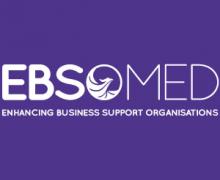EBSOMED is a 4-year project, co-financed by the European Union and coordinated by BUSINESSMED as part of a consortium of six partners. More than thirty organisations from 26 countries are also affiliated to the project....
BUSINESSMED Thematic Committee Webinar - Vocational Training and Skills Development
BUSINESSMED Thematic Committee Webinar - Vocational Training and Skills Development
Last year’s rapid shift toward digitalized economies has, now more than ever, underlined the skill gap between jobs and job seekers’ qualifications. The bridging of this gap is of particular importance for the Southern Mediterranean, where unemployment rate reaches 30%, and where the skill mismatch is listed as one of the main causes by employers. (UfM 2020). The pre-existing gap along with the recent fast-paced changes in our economies has put VET and Skills development at the forefront of institutions and government agendas.
The European Union through its “European Skills agenda for sustainable competitiveness, social fairness and resilience” showcases the importance put on the VET sector, more specifically within the digital and green economy field. This can also be seen by the increase of the new Erasmus + budget, which with an estimated budget of 26.2 billion, nearly doubles the size of the previous programming phase (2014-2020). These increased efforts are and will not only be located on European soil, within its “Renewed partnership with the Southern Neighbourhood - A new agenda for the Mediterranean” the EU also shows and increased focus on skills development for Southern Mediterranean Countries especially in the area of digitalization and green economy.
25 years after the launch of the Barcelona process, the UfM is also continuing to put skills development and employment at the forefront of its agenda to counterbalance socio -economic inequality, as well as climate change related issues, that are present in the Mediterranean region. This is done through the “UfM Initiative to reinforce the innovation-employability nexus in the Mediterranean”, an initiative promotes collaboration between stakeholders involved in addressing the unemployment rates, and through the publishing of an Handbook on the topic (UfM, December 2020).
The efforts made in this sector will continue to be of relevance for the Southern and Eastern Mediterranean in the upcoming years, where according to the Union for the Mediterranean (UfM), almost 60% of the regional population is today under the age of 30. The young population represents an asset for the region, and therefore, a positive and action-oriented regional agenda on youth employability is indispensable to unleash the region’s human and economic potential capital. The Region has made advances over the years in this field, nevertheless progress has been slow, and many challenges are ahead. Despite a series of reforms, MENA Countries have a considerable potential, and the current situation requires a renewed focus on education and vocational training (VET).
BUSINESSMED, similarly to its international partners, has already started working on the topic with the establishment in 2018, within the EBSOMED project, of its Thematic Committee on Vocational Training and Skills Development. Today the Committee continue to analyze trends within the field to provide studies and recommendation to feed policy makers and international actors with the aim of creating successful employment and social policies matching today’s economy requirements of flexible and tangible silks that boost organizational performance and competitiveness and innovation.
Almost a year after the presentation of the first periodical study on the region, the committee has continued to analyze current trends within the VET and Skills development sector and is here to present and discuss the results of its second survey.
In this sense, BUSINESSMED, in the framework of EBSOMED, is organising a webinar on 14 September 2021 in order to:
- Present the 2nd periodical survey following the empirical results of the study.
- Share information and facilitate peer learning about how various TVET stakeholders (policymakers, providers, the private sector, including companies involved in work-based learning, and youth) have been implementing TVET provision in the Euro-Mediterranean Region.
- Share Employers experiences on approaches in upskilling and reskilling their workforce.
- Identify key building blocks of a resilient and labor-market relevant TVET system.
Register here
Registration is available via this link.


















